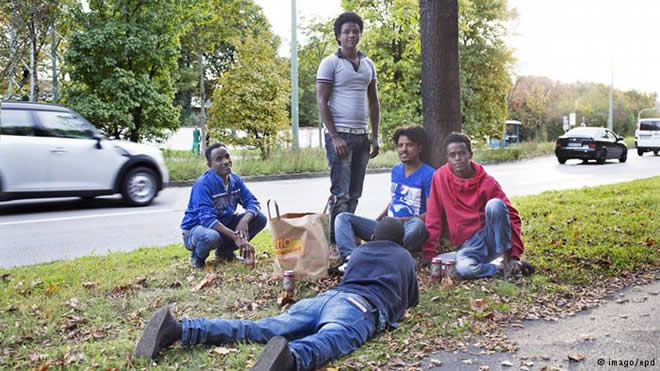

Wednesday, July 22, 2015
Eritrean translators are deliberately mistranslating the testimonies of refugees during their hearings, according to dissidents' groups in Germany. Some are even intimidating them into hiding human rights abuses.
"He asked us, 'Wait, where's the part where I was tortured in prison?' And we said, 'that's not in here.' He was completely horrified," Rut Bahta, co-founder of the Frankfurt-based Eritrean dissident network United4Eritrea, said she has a few stories along these lines.
Her group, which provides support for new arrivals from Eritrea, often has to retranslate into Tigrinya the transcripts of their asylum hearings, which the authorities only provide in German. It's at this point, Bahta said, many find out that the state-assigned translators had mistranslated or omitted major details.
"He couldn't believe it at first - we had to get a third person to translate," Bahta told DW. "He'd been through countries like Sudan and Libya, where no one ever asked him what happened to him. This was his first time in Europe, and he thought everything would be done properly now. He was utterly shocked - disappointed in the institution."
A mini-government in Germany
Bahta thinks there is only one explanation for what she sees as deliberate misdirection. She and many Eritreans in Germany are convinced that some of the translators assigned to asylum seekers in Germany are either loyal to Eritrea's repressive regime or even on its payroll.
Many of them, she suspects, are being compensated by the Eritrean embassy for information regarding the regime.
"The embassy is like a little mini-government on German territory," said Bahta. "Some of the refugees say, 'I've come over 5,200 kilometers to get here, and it's exactly the same game - okay, I have a few more freedoms, and I can't be put in jail for no reason, but the fear is still there.' "
The human rights situation in Eritrea, sometimes called the "African North Korea," is one of the worst in the world. A United Nations report published in June said that in the small East African country, "information collected on people's activities, their supposed intentions and even conjectured thoughts is used to rule through fear in a country where individuals are routinely arbitrarily arrested and detained, tortured, disappeared or extra-judicially executed."
The UN also backed up Bahta's suspicions about the reach of the government into the diaspora: "The spying web has its outposts outside Eritrea, used to control the Eritrean population in the various countries where they reside," the report said.
Transferred politics
Eritrea's politics have transferred to immigrant communities in Germany. Sometimes they are so ingrained they get passed across generations - sons and daughters are assumed to have political affiliations based on their family names.
Job Maasho, a 68-year-old Eritrean who came to Germany in 1982, has often helped asylum seekers deal with authorities when they arrive in Germany, and he has heard many stories of translators intimidating new arrivals.
"For example they tell them not to explain things the way they are, the political situation - they say 'you can't say this, you have to say it like this,'" he said. "They try to give as little information as possible, so then they leave the political things out. They want the refugees to arrive here to be recognized only as economic migrants."
Hostile hearing
Bahta was angry enough to attend a hearing herself and was taken aback by its hostile atmosphere.
"The whole tone was horrible," she said. "The translator was really harsh, snapping at the asylum seeker. It was awful. Also, he was really irritated that I was there."
Bahta has noticed that many Eritreans arrive in Germany too cowed by the government they've just escaped to speak out against intimidation here.
"When we tell them, wait a minute, we have to do something about that, they're always really surprised that you can do something," she said. "That's why [the translators] have such an easy time with them, because they're already so scared."
The problem is compounded by the fact that the German Federal Office for Migration and Refugees (BAMF), the authority that hears asylum proceedings in Germany, doesn't necessarily recognize how political the Eritrean community is. "It's a highly politicized context in which the hearings take place," said Eden Mengis, who has just finished investigating the issue as part of a Master's thesis.
No control
As it stands, there is no way for the German authorities to check whether translators are passing on information about refugees to the Eritrean embassy. This may have vital consequences, since, as Mengis said, the Eritrean government can use the personal details of refugees to impose reprisals on relatives back home and effectively ransom them.
"If an escape is successful, and the government learns of it, then there is the danger that the relatives of those staying behind get arrested and are only released on payment of a large fine," she said.
At the moment, the German government considers the human rights situation in Eritrea so poor that no one who has made it here need fear deportation back to Eritrea. But because of the EU's "Dublin Agreement," they can be sent back to the EU country they first arrived in, which for most Eritreans is Italy. "People are often sent back to Italy," Bahta said. "The German government should be applying more pressure."
In fact, the German government denied the problem exists at all and insisted that translators were rigorously tested.
"The problem you have described is not known to us as a general problem among Eritrean translators," BAMF spokesman Christoph Sander said in an emailed statement. "We have no indications either from outer branches, or from other sources."